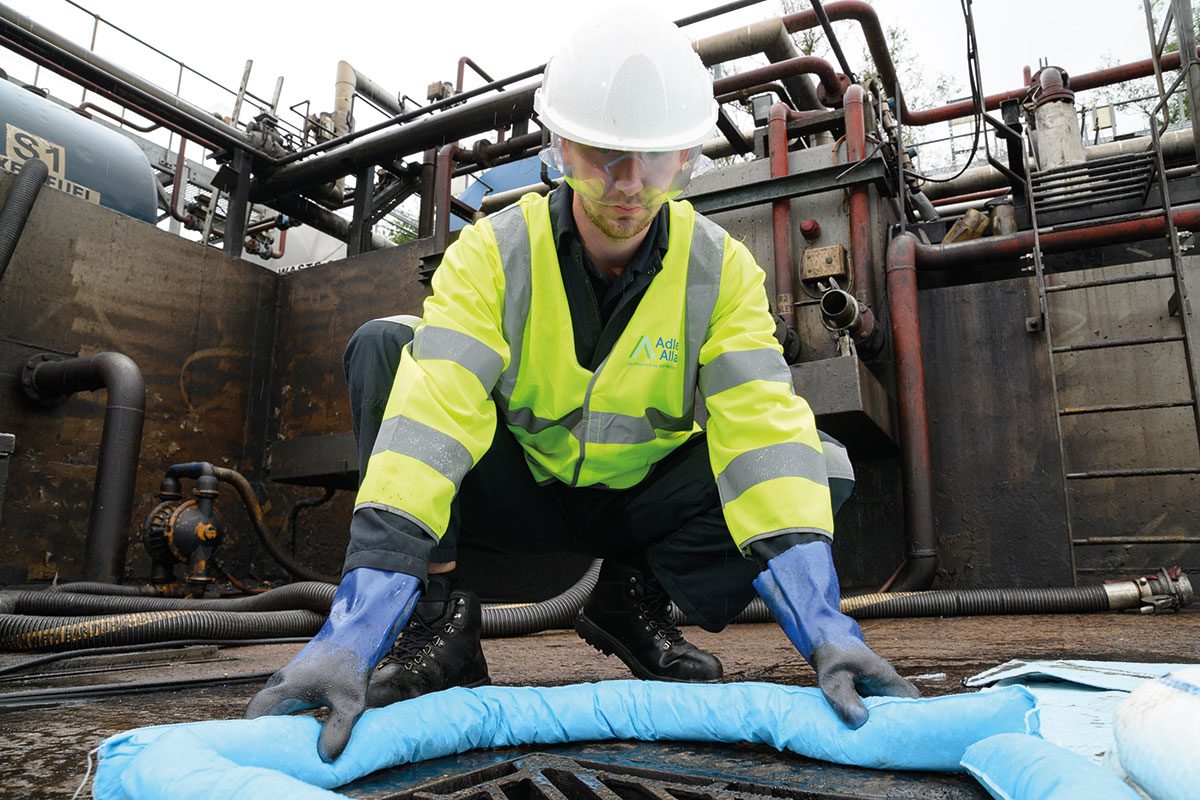Site operators should be aware of the legal, as well as practical implications of a spill. Environmental and health and safety law imposes certain duties on site operators which, if not complied with, can result in legal proceedings, fines and reputational damage. Reuben Richings, Technical Response Manager, Adler and Allan and Simon Tilling, Partner, Burges Salmon, outline the legal implications of a spill – both financial and reputational – and the importance of having an adequate emergency response plan in place.

Apart from the time and expense of containing and cleaning up a spill, this kind of incident can have a number of legal implications. These should be considered by businesses responsible for storing, using or transporting potentially polluting materials. While typically hazardous substances such as oils and pesticides are widely understood to result in pollution if released into the environment, even food products and beverages can present an environmental hazard and will be caught by relevant legislation.
A spill could result in a criminal prosecution by the relevant regulator under various regulatory regimes, and it could also lead to nuisance or negligence claims from persons affected by the spill. A business responsible for a serious spill could, therefore, be made to answer its case in both criminal and civil courts.
Liability and legislation
Criminal liability for environmental offences can arise in the event of a regulatory breach.
Under the Environmental Permitting regime, for example, if substances are released into controlled waters as a result of a spill, the person or entity responsible for that spill may be required to comply with enforcement notices served by the regulator and/or be prosecuted for the spillage itself.
Under the Environmental Damage (Prevention and Remediation) Regulations 2015, it is a criminal offence to fail to take all practicable steps to prevent further damage if an activity has caused environmental damage and it is also a criminal offence to fail to comply with a remediation notice requiring certain clean-up steps to be taken. Specific licences must also be obtained by businesses releasing trade effluent into public sewers. As such, an accidental spill of trade effluent could be an offence under the trade effluent consent obligations of the Water Industry Act 1991. The Control of Major Accident Hazards (COMAH) regime may also apply to sites handling or storing dangerous substances.
Written records
This legal regime imposes certain obligations on site operators, including preparing and retaining a written major accident prevention policy and (in the case of “upper tier” establishments) producing a safety report with arrangements in place to deal with major accident hazards. Time should be invested ahead of any incident to think these plans out in order to make them as detailed, robust and effective as possible should a spillage occur.
Environmental offences are also often “strict liability” offences, meaning that offending businesses tend to plead guilty and focus their defence efforts on the level of sanctions proposed by the prosecutor. The nature and level of those sanctions depend on three main factors. First, the courts will consider the level of environmental harm which was caused (or could have been caused). The culpability of the offender will also be assessed, as well as the size of turnover in the case of a corporate offender.
Environmental offences are often “strict liability” offences, meaning that offending businesses tend to plead guilty and focus their defence efforts on the level of sanctions proposed by the prosecutor
Levels of culpability
Culpability for environmental offences ranges from deliberate to “low culpability”. Deliberate environmental offences are rare, but businesses who do not take sufficient care to reduce the risk of spills could be deemed “negligent” or even “reckless” by the courts. Businesses with a good track record of following robust processes to reduce such risks will be in a better position to argue that an offence was not committed deliberately or recklessly and, thereby, reduce the level of sanctions imposed on them for the offence.
Sanctions: increasing severity
There has been a push in recent years to ensure that compliance with environmental protection regimes is taken seriously by businesses of all sizes. Notably, prosecutors are keen that the sanctions imposed on offending businesses are severe enough to be noticed by shareholders. This has resulted in a marked increase in the level of fines over the last decade, especially for large companies. Very large companies have been made to pay fines into the millions of pounds for letting untreated sewage spill into rivers.
In certain circumstances, senior officers of offending businesses can be held personally liable. This can arise where the officers are so closely involved with the day-to-day operations that the offence is attributable to them, or because the offence committed by the company is committed with their “consent, connivance or neglect”. Penalties for senior officers in their personal capacity are rare and usually reserved for repeat or deliberate offending. However, it is worth noting that sanctions are severe, including the possibility of disqualification of directors, fines and (in the most extreme cases) prison sentences lasting several months.

As well as regulatory compliance, site operators should be aware of the civil liabilities that could arise from a spill. For example, if the spill affects neighbouring land there can be claims for clean-up costs under the law of nuisance. Landlords will also demand remediation under tenancy agreements, and if the site is subject to an installation permit, the environmental regulator can demand that the site is brought back to baseline condition (the condition before the spill). In the case of large-scale spills affecting a local community, local businesses and their insurers could face multiple claims and be required to cover the costs of remediation.
Finally, the reputational damage from a pollution event and ensuing investigations may be as much a concern for businesses as strictly legal consequences. In light of the high legal and reputational stakes, the adage that “prevention is better than cure” applies acutely to businesses handling potentially polluting substances.
But it doesn’t have to be complicated. The right supplier with knowledge of the law and technical capability will be able to de-risk your business, giving you peace of mind that you are as prepared as you can be for an environmental incident.







